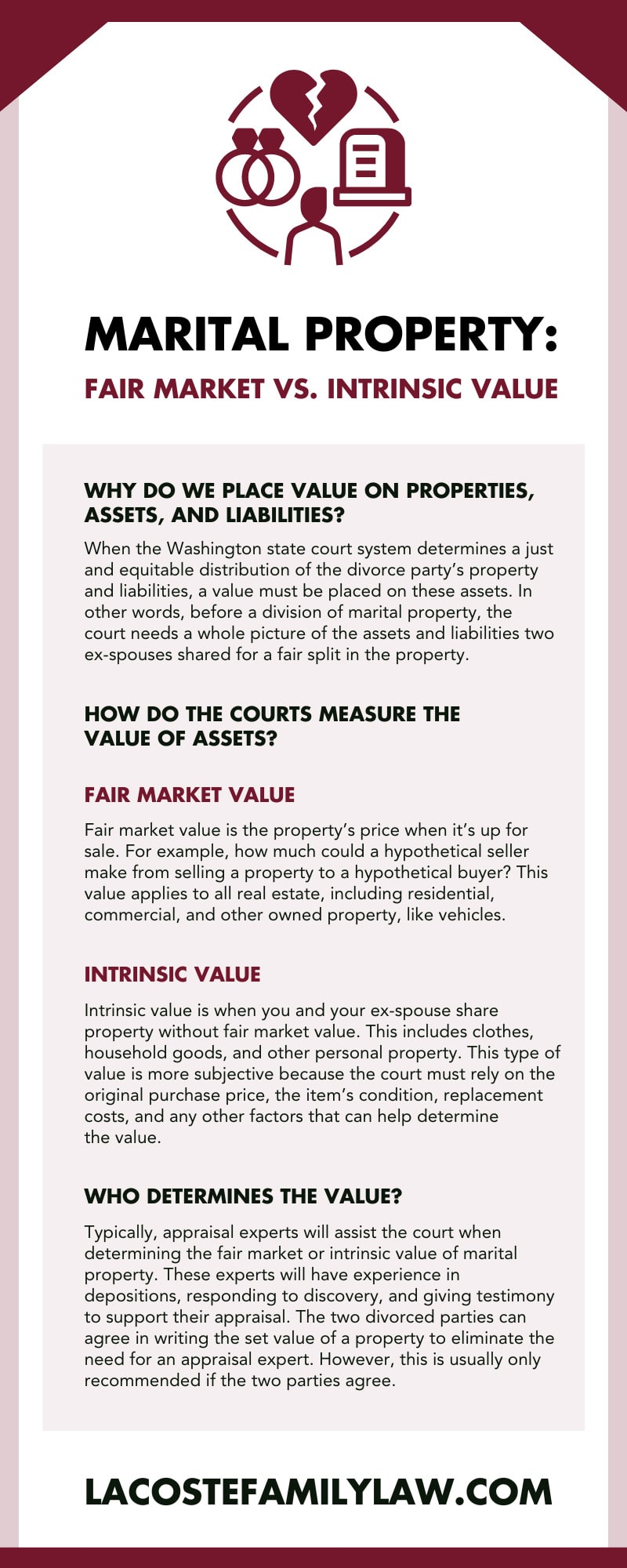
22 May Marital Property: Fair Market vs. Intrinsic Value
Property, assets, and liabilities typically need to be divided and awarded equitably to each party in a divorce. How the court determines the value of marital property includes both fair market and intrinsic values. It sounds like this can make the divorce messy, but how Washington state divides these assets is quite simple. Keep reading to learn why we place value on property, how the court measures value, who determines the value, and more.
Why Do We Place Value on Properties, Assets, and Liabilities?
When the Washington state court system determines a just and equitable distribution of the divorce party’s property and liabilities, a value must be placed on these assets. In other words, before a division of marital property, the court needs a whole picture of the assets and liabilities two ex-spouses shared for a fair split in the property.
It’s important to note that in a community property state like Washington state, assets and debts are listed as community or separate property. Generally, separate property or assets and debts brought into the community are excluded from being divided. This can be tricky with items such as real estate or businesses, but the court will do its best to determine a pre-community value and assess the division from that point on.
How Do the Courts Measure the Value of Assets?
Within the court system, they can place a fair market or intrinsic value on your assets and properties. Each value entails something different, so it’s essential to know their differences.
Fair Market Value
Fair market value is the property’s price when it’s up for sale. For example, how much could a hypothetical seller make from selling a property to a hypothetical buyer? This value applies to all real estate, including residential, commercial, and other owned property, like vehicles.
Intrinsic Value
Intrinsic value is when you and your ex-spouse share property without fair market value. This includes clothes, household goods, and other personal property. This type of value is more subjective because the court must rely on the original purchase price, the item’s condition, replacement costs, and any other factors that can help determine the value.
Who Determines the Value?
Typically, appraisal experts will assist the court when determining the fair market or intrinsic value of marital property. These experts will have experience in depositions, responding to discovery, and giving testimony to support their appraisal. The two divorced parties can agree in writing the set value of a property to eliminate the need for an appraisal expert. However, this is usually only recommended if the two parties agree.
Furthermore, there are a few ways to determine the value of properties that you should never use. You should never use the following methods because they can be unreliable and inadmissible:
- Using values listed on Zillow.com, Realtor.com, and other real estate websites
- An appraisal by your bank for the home purchase
- Using tax-assessed values
- Using a “Comparable Market Report” from your Realtor
What Does a 50/50 Division of Shared Property Look Like?
Washington state is a 50/50 divorce state. Typically, the court will divide all shared assets among divorced spouses equally. However, this doesn’t necessarily mean everything will get divided in half. Usually, each spouse will get awarded their separate assets, while the net value of community properties gets split 50/50 after calculating their net worth.
So, how does the court divide community property between you and an ex-spouse? Most parties believe they must sell their shared assets to receive half of the proceeds. This is not how the court system divides this. Rarely will a court order a couple to sell their home or assets. Instead, each party is typically awarded whole items to balance the 50/50 agreement.
To provide a better example, let’s review what community property can consist of and how a court typically divides it. Let’s say you share the following assets with an ex-spouse:
- A home worth $150,000 and a mortgage of $110,000
- One spouse’s car worth $5,000 and a $5,000 loan
- Another spouse’s car worth $10,000 and a $10,000 loan
- A 401K retirement account with $80,000
The total assets would equal $245,000. The debt would total $125,000. Subtract the two, and you have a net community value of $120,000. Half of this net value, or the amount of money going to each party, would total $60,000.
For the court to distribute this amount equally, they might give each spouse a different property. For example, the court might award you the house ($150,000), the mortgage ($110,000), your car ($5,000), the car loan ($5,000), and $20,000 from the 401K account. Your ex-spouse would receive their vehicle ($10,000), the car loan ($10,000), and $60,000 from the 401K account. This divides the assets equally among both parties.
What Is the Difference Between Separate and Community Property?
As you can gather, community property is any asset that the divorced couple bought or shared throughout their marriage. Separate property consists of assets acquired before the marriage or after the separation. Both definitions apply to liabilities as well.
While those differences are cut and dry, the Washington court system has many exceptions to these rules. If an item or asset was a gift, unless given to both spouses, it’s considered the separate property of whoever received it. Inheritances work the same way. An item might have gotten acquired before marriage but can get treated as community property if the divorced parties share the finances.
When separate and community properties get commingled (when the court cannot trace the asset), the court considers them community property. If separate property earnings get used to purchase something after the separation, they will also get considered separate property. This is the “tracing rule” and also works for community assets.
Knowing the difference between separate and community properties and their type of value can help you better understand how the Washington court system will award you and your ex-spouse your marital assets. It’s crucial that you work with a property division attorney in a dissolution proceeding to ensure the value of all assets is true and accurate. Contact LaCoste Family Law to help divide your assets in a divorce.


